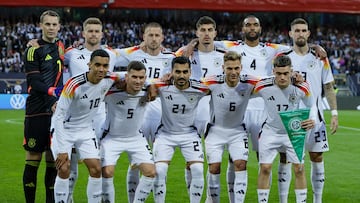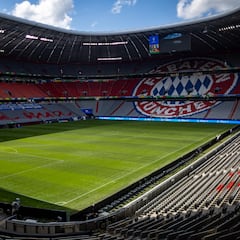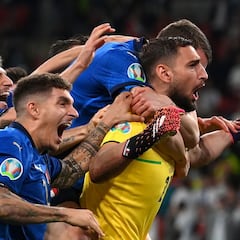What are the lyrics to and meaning of the German national anthem?
“Deutschlandlied” / “Das Lied der Deutschen” will be played at Euro 2024 before matches involving the Germany national team.


Anyone who has followed the FIFA World Cup, UEFA European Championship, Olympic Games or indeed almost any sporting event will probably be familiar with the melody of German national anthem “Deutschlandlied,” officially titled “Das Lied der Deutschen” (”The Song of the Germans”), if not necessarily its name or lyrics.
Written by Austrian composer Joseph Haydn in 1797, the lyrics to “Das Lied der Deutschen” were added by linguist and poet August Heinrich Hoffmann von Fallersleben in 1841, although it wasn’t until 1922 that the song officially became the national anthem of Germany until 1945, of West Germany from 1950 to 1990, and of a reunified Germany from 1990 onwards. East Germany used a different anthem between 1949 and 1990.
It’s probably not too controversial to suggest German history, especially in modern times, is a somewhat complicated affair, which is reflected in the country’s national anthem. And that partly explains the five-year gap in the immediate aftermath of the Second World War when the hymn was banned.
German national anthem lyrics and translation
“Deutschlandlied" / "Das Lied der Deutschen” lyrics
German original lyrics
Einigkeit und Recht und Freiheit
Für das deutsche Vaterland!
Danach lasst uns alle streben
Brüderlich mit Herz und Hand!
Einigkeit und Recht und Freiheit
Sind des Glückes Unterpfand –
Blüh' im Glanze dieses Glückes,
Blühe, deutsches Vaterland!
English translation
Unity and Justice and Freedom
For the German Fatherland!
After these let us all strive
Brotherly with heart and hand!
Unity and Justice and Freedom
Are the security of happiness –
Bloom in the splendour of this happiness,
Bloom, German Fatherland!
Three stanzas were originally used in “Das Lied der Deutschen”, the lyrics of which initially intended to promote the concept of a unified nation above regional differences.
Why the modern German anthem was shortened
However, with the song retained as the anthem of Nazi Germany, the words of the first stanza, which refers to German settlers spreading beyond the country’s geographical borders, became reinterpreted, or perhaps misinterpreted, as justification for German expansionism and even as a claim of world domination.
Related stories

Allianz Arena's new Euros identity

Who are the kings of the Euros?
As a result, the now unused first stanza is associated with the Nazi regime and its crimes and is is considered taboo in Germany - and beyond.
Since the fall of Nazi Germany, the modern version - the one heard at sporting events - only includes the third and final stanza. That includes repetition of the line “unity and rights and freedom,” which is now considered the unofficial national motto of Germany and is included on the rims of Euro coins made in Germany.

Complete your personal details to comment